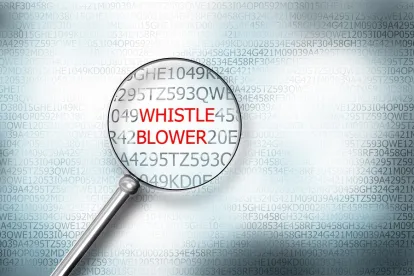Virginia’s new whistleblower protection law, the Fraud and Abuse Whistle Blower Protection Act (the law), will go into effect on July 1, 2020. The law, signed this month by Governor Northam, protects workers engaged in a wide variety of conduct from, and provides redress for, unlawful retaliation by their employers. Significantly, the law allows for direct access to Virginia courts and authorizes a qualifying, protected whistleblower to bring an immediate civil action for violations of the law. Litigants can seek injunctive relief, reinstatement, and uncapped compensation for lost wages, benefits, and other remuneration, as well as recovery of reasonable attorneys’ fees.
Prior to the enactment of the new law, Virginia offered scant protections for whistleblowers. In fact, the Supreme Court of Virginia previously declined to recognize generalized, common-law “whistleblower” retaliatory discharge claims. See, e.g, Dray v. New Mkt. Poultry Prod., Inc., 258 Va. 187, 191, 518 S.E.2d 312, 313 (1999)(finding discharge of employee based on her reporting of unsanitary conditions in employer's poultry plant to on-site government inspectors failed to state a claim for wrongful discharge in violation of public policy); see also Lawrence Chrysler Plymouth Corp. v. Brooks, 251 Va. 94, 465 S.E.2d 806 (1996)(rejecting whistleblower claims of motor vehicle repairman who alleged he was discharged for his refusal to use method of repair that he believed unsafe); Miller v. SEVAMP, Inc., 234 Va. 462, 362 S.E.2d 915 (1987) (rejecting retaliatory discharge claim of employee who alleged she was fired for appearing as witness at co-employee's grievance hearing). Similarly, Virginia’s common law wrongful discharge tort provided only a narrow exception to the at-will employment doctrine for those discharges that violated public policy. See generally Bowman v. State Bank of Keysville, 229 Va. 534, 540, 331 S.E.2d 797, 801 (1985). The new Law, however, provides broad protections for employees who “report any violation of federal or state law or regulation,” including internal complaints to supervisors. 2020 Virginia House Bill No. 798, Virginia 2020 Regular Session (enacted as Virginia Code § 40.1-27.3).
The law prohibits the discharge, discipline, discrimination against, threats, penalties, or changes in an employee’s compensation, location, terms and conditions, or other privileges of employment because of the employee’s participation in protected activities. See id. Protected activities under the Act include (1) reporting violations or suspected violations of federal or state law, (2) refusing to engage in criminal acts or carry out orders that would violate federal or state laws, or (3) providing or being requested to provide information or testimony in state or federal proceedings or investigations into violations of state or federal laws or regulations. Id. Thus, the new law represents a significant expansion of employment protections in Virginia and creates new causes of action and liabilities.
Unlike in other traditional employment claims, litigants are not required to exhaust administrative remedies before bringing an action under the new law. Nor is there any requirement of mediation or conciliation prior to filing suit. Instead, an employee alleging retaliation may bring a civil action within one year of the prohibited retaliation without first filing a claim with an administrative body. As a result, litigants may obtain (1) injunctive relief to restrain continued violations, (2) reinstatement to the same or an equivalent position held before the employer took the retaliatory action; and/or (3) compensation for lost wages, benefits, and other remuneration, together with interest, as well as (4) reasonable attorneys’ fees and costs.
Thus, the new law may potentially result in liability for employers who run afoul of these new whistleblower protections. Employers who already understand the need for policies that prohibit discrimination may want to review their policies for the possible inclusion of language prohibiting retaliation and the adverse treatment of whistleblowers in order to avoid or minimize potential liability.




 />i
/>i

